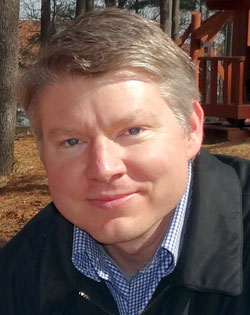
Professor Brian Kyte — Dept. of Chemistry
Where are you originally from?
I was born in St. Petersburg, Fla., and spent most of my childhood in the Tampa Bay area.
Where did you complete your education?
I was an undergraduate student at Austin Peay State University where I earned my B.S. in chemistry with a Philosophy minor. I then went to the University of Florida where I earned a Ph.D. in Chemistry with Biochemistry as my sub-discipline.
Where have you taught prior to coming to HSU?
I began my teaching career as a temporary faculty member at Eckerd College (for two years) in St. Petersburg, Fla. I then taught at Saint Michael’s College (for three years) in Colchester, Vt., and Boston University (for almost six years).
What are your specific areas of expertise?
I have expertise in the area of biocatalysis. Essentially, I am interested in catalyzing chemical reactions using proteins. These reactions would not be possible using traditional “chemical” reagents or may be harmful to the environment due to the use of heavy metals. We have been successful in using these proteins and, with the type of reactions we are running, our only byproduct is water.
What classes are you teaching this year?
I am teaching the lecture and discussion for CHEM 438, Introductory Biochemistry, and some lab sections for CHEM 328, Brief Organic Chemistry.
What attracted you to Humboldt State?
There were several things that were attractive about HSU. Some of the most important things I liked were the temperate climate, the small-town atmosphere, and the faculty I met in the Chemistry and Biology departments. I also really enjoy the proximity to the ocean, the mountains, and trails.
What do you do in your free time outside the classroom?
Hiking, camping, and (more of a recent interest) biking.
What is your favorite classroom technique to engage students?
I find that most students enjoy solving complex problems so I have students work in small groups to tackle some questions that they might not be able to address on their own. These exercises reinforce basic concepts and develops their interpersonal skills which will be valuable when they need to form collaborations to solve even more complex problems.
What is the best thing about being a university professor?
With a great group of students and faculty I feel fortunate to have a job that lets me be a part of a community dedicated to education.
Where is the strangest place you’ve done research?
Large chemistry research labs are not usually in strange locales but they can have a very diverse group of people dedicated towards solving similar problems, which makes them a very interesting place to work.
If you weren’t an HSU professor, what would you be?
I don’t think I would change professions so I would be teaching somewhere.
What superpower would be most valuable to your research?
Omniscience.